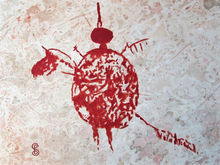Artwork

Dedication
Inspiration & Encouragement to keep Native Culture alive
"Both of my parents were descendants of the early peoples of the Great Lakes and members of their respective medicine lodges. In 1978, my father, the inspiration for my artwork, became a counselor at Mash-ka-wisen, an addiction treatment center owned and operated by Native Americans. Since then, Mash-ka-wisen has helped thousands of Native People."
Paula Sayers

My Dad - Phil Sayers circa 1990
Preserving Traditions
Keeping our heritage alive
"In the 21st Century, Native American storytellers and wisdom keepers are disappearing. Native American culture was once deeply embedded in symbolism, now, many of us have forgotten the signs and symbols that our ancestors created to help us navigate through life. I hope my work will be an incentive to people everywhere and emphasize the importance of the preservation of ancient Native American traditions."

Basswood river pictograph
Red Earth paint
Pictographs all around the world
Red earth occurs naturally as hematite or limonite, and can be found all around the planet. Prehistoric folks harvested it in large amounts and then stored it for later use. Native American spiritual leaders often carry a small amount in what is called a 'paint bag,' when healing or helping people.

Fighting Moose pictograph
Early Peoples
painted pictographs
Prehistoric finger painting
Archeologists will continue to debate precisely when people first began creating pictographs however if you ever did finger painting in childhood, it’s easily perceived that early man might have indulged in similar pleasures. And though Ruth Faison Shaw introduced finger painting to school children in America, in prehistoric times, individuals probably used a similar technique to create rudimentary shapes and forms, on whatever surface might have been at hand.

Bear Gulch Warrior image
Native American pictograph studies
Monochrome studies by Paula Sayers

The images in this section are monochromatic studies of known Native American pictograph images in North America, enthusiastically researched by the artist. Click on any image to learn more.

Stylized pictograph art
The concept of Native cultural evolution
While it is imperative to maintain important cultural traditions as they were observed and practiced by our ancestors, it is equally important to allow for inspiration and creativity. Not everyone who ever painted a pictograph was a skilled artisan. Conversely, some pictograph painters were exceptionally gifted in their renderings. Making a provision for stylized art as an accepted method of cultural expression, will permit continued inspiration and growth for everyone who carries Native traditions forward.

“Anish clans" - a stylized pictograph painting by Paula Sayers honoring members of her Native American family and their heritage.
Underwater Panther (below), is Paula Sayers tribute to Norval Morrisseau. Her studies of the art of the Woodlands School and the paintings of Norval Morrisseau, who was also known as Copper Thunderbird have been a great inspiration for her own stylized work.

“Mishipeshu” - Underwater Panther was painted by Paula Sayers on the 10th Anniversary of Norval Morrisseau’s death; December 4, 2017
Paula's pictographs on stone are created on commission. Large projects often require 'on-site' painting. From time to time, limited original paintings are available on hardboard, canvas or stone. Please email or write with inquiries. Thanks.













